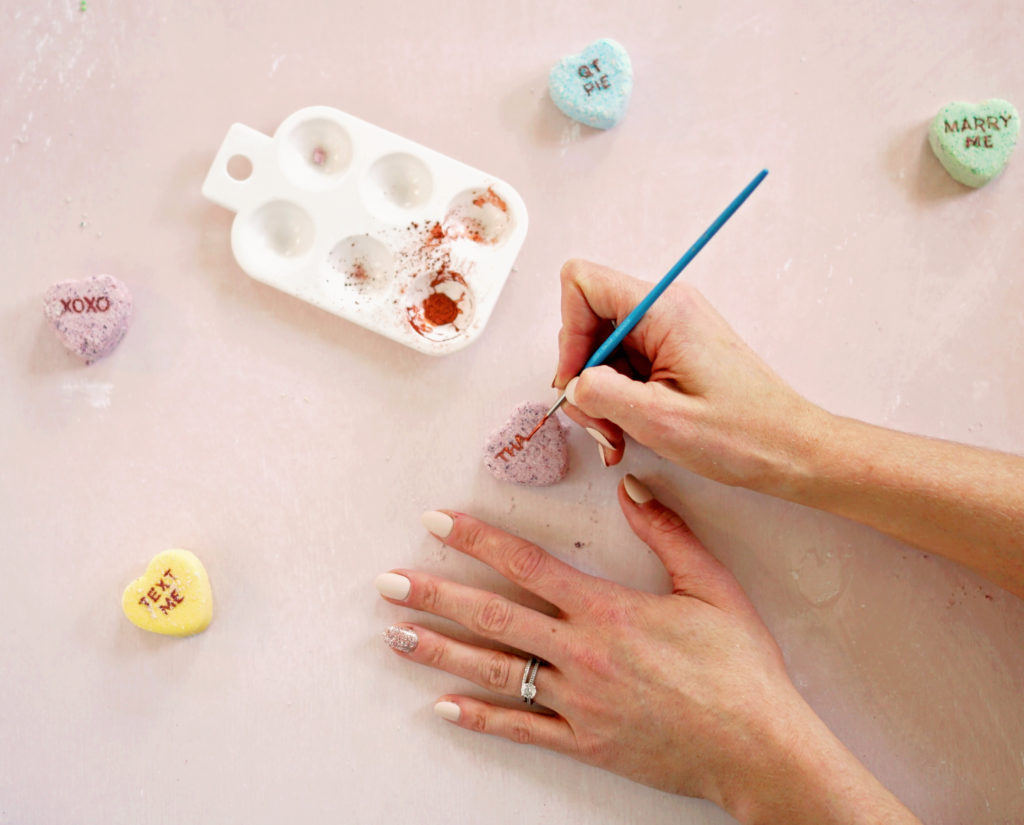Spread The Love With These Easy-To-Make Valentines
This Valentine’s Day, you could give your kids a traditional box of tiny cards to pass out to their friends at school. Or you could work together in the kitchen to make the most creative valentines in the class: conversation heart bath bombs!
Given the hefty price tag of store-bought versions, bath bombs may seem like complicated concoctions. Actually, they’re shockingly simple and affordable to make at home, and the activity provides the perfect opportunity to teach your kids about mixing colors, measuring ingredients and what happens when you combine citric acid, baking soda and water. (Hint: It fizzes!)

When you’re finished, you’ll have larger-than-life conversation hearts that look good enough to eat but are best enjoyed at bath time.
Supplies
For the bath bombs
❤ 1 cup baking soda, plus 4 extra spoonfuls
❤ ½ cup citric acid (available in the grocery store canning section)
❤ 10-15 drops cotton candy fragrance oil (optional)
❤ Water-based food coloring in four or more colors
❤ 2 teaspoons almond oil
❤ Witch hazel in small spray bottle
❤ 5 small mixing bowls
❤ Flour sifter
❤ Fork or whisk
❤ Spoon
❤ Heart baking mold
For the lettering
❤ A pinch of pink mica (available online or some craft stores)
❤ A few drops of vodka or rubbing alcohol
❤ Thin paintbrush
Instructions
1. In a small bowl, mix baking soda and citric acid. Use a flour sifter to break up any clumps. For scented bath bombs, mix in the fragrance oil.
2. In four separate bowls, add assorted food coloring to a spoonful of baking soda and mix with fork or whisk, breaking up clumps. Aim for bright, saturated color.

Note: Be sure the newly colored baking soda is dry before moving to the next step to prevent fizzing.
3. Divide the baking soda and citric acid mixture from Step 1 evenly among the four bowls of colored baking soda. Mix each bowl thoroughly with fork or whisk.
4. Add about 1/2 teaspoon of almond oil to each bowl and mix thoroughly. The texture should feel dry but resemble damp sand and hold its shape when squeezed.
Too dry? Spritz with witch hazel and continue to mix. Spray a little at a time to avoid setting off the chemical reaction!
Too wet? Add more dry ingredients at a ratio of 2 tablespoons of baking soda to 1 tablespoon of citric acid and mix.
5. Spoon mixture into the heart baking mold, packing it down tightly. I recommend overfilling the mold and then pressing the mixture down with the back of a spoon, adding more as needed until flat.
6. Flip mold over and gently bend and tap to release bath bombs onto a flat surface. Let them dry overnight,
flat-side down.
Note: If hearts crumble when released from mold, return mixture to a bowl, spritz with witch hazel, mix and repeat Step 5.

7. When bath bombs have dried thoroughly and are hard to the touch, you can paint words on them. Mix a pinch of pink mica powder with a few drops of vodka or rubbing alcohol. (Alcohol evaporates more quickly than water, which will prevent bath bombs from activating early and fizzing up.)
8. Write on surface of each bath bomb using mica mixture and a very thin paintbrush. Test a small dot first. If dot fizzes, your mixture has too much liquid. Add more mica powder or wait until a bit of the alcohol evaporates off.
9. Let words dry for at least two hours before packaging bath bombs in airtight containers or bags.
Please share pictures of your conversation heart bath bombs on social media with the hashtag #Frederickschildmag so we can see your creativity. Happy crafting, friends!
This story originally appeared in the February 2020 issue of Washington FAMILY, a sister publication of Frederick’s Child published by Mid-Atlantic Media.




